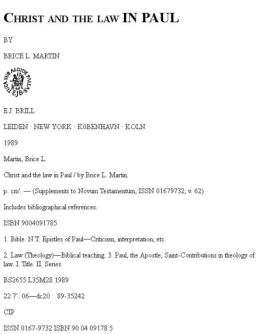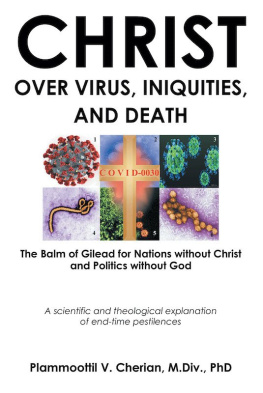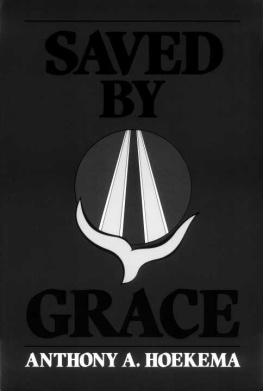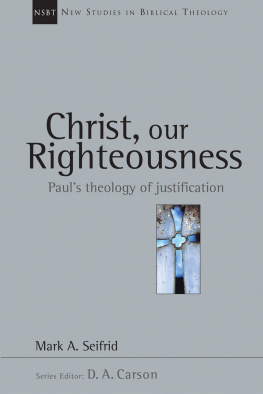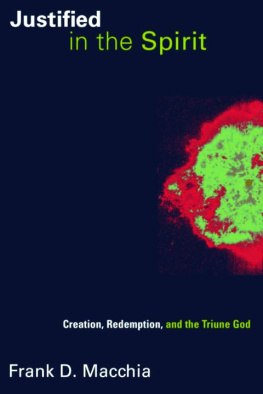3 THE PROBLEM: SIN, DEATH, LAW, AND FLESH
W. Gutbrod claims that "Pauls radical understanding of the Law can be apprehended only in the light of his inner starting point, namely, the act of forgiveness and justification accomplished by the cross of Christ...." has argued that for Paul in the matter of salvation the solution precedes the problem.
The death and resurrection of Jesus as the saving event, and mans participation in that death and resurrection is the solution to the dilemma of man, and at the same time Pauls fundamental starting point about the meaning of the law.
The law, sin, death, and flesh are the reasons for the dilemma of man. Man cannot save himself by means of the law. The law is aligned with sin and death, but at the root of sin is the problem of flesh. The elements in the dilemma are given at Romans 7:5: "While we were living in the flesh (en t sarki ), our sinful passions ( ta pathemata ton hamartidn) aroused by the law ( ta dia tou nomou energeito ), were at work in our members to bear fruit for death (tg thanatg)."
In this chapter we shall consider the dilemma of man and the relation of the law to the dilemma. In the next chapter we shall consider the solution.
3.1 Sin And Death
Though the law be "holy" and the commandment "holy and just and good" (Rom 7:12), though "the oracles of God" (ta logia tou theou , Rom. 3:2), and "the giving of the law" (he nomothesia , Rom 9:4) be in themselves blessings, the law in the concreteness of history has not met the dilemma of man and relieved it; it has sharpened and worsened it. This is entirely due to the situation of man the sinner. He is in bondage to sin (Rom 6); and though he validates the bondage by his own evil acts (Rom 6:23; cf 5:12f), he is above all victim, "sold under sin" (pepramenos hypo ten hamartian , Rom 7:14). Sin (hamartia) is conceived as a personified ruling power.
For man the ultimate consequence of this rule of sin and enslavement to sin is death. Being a slave (doulos) of sin leads to death (Rom 6:16), and sinful passions (ta pathemata ton hamartion) bear fruit for death (thanatos) (Rom 7:5). The wages of sin (ta ... opsonia tes hamartias , Rom 6:23), and the end (to ... telos) of the one who sins (Rom 6:21; cf 6:16; 1:32), is death (thanatos). To "me" (= ego in Rom 7) it was sin (he hamartia) that was working death (egeneto thanatos , Rom 7:13; cf 7:24); when sin revived ( anezesen ) "I" (ego) died (apethanon, Rom 7:9).
The condition of man is ruinous. This ruinous state is traced back to Adam. Adam initiated a process of sin and bequeathed mankind a heritage of death. It was "through one man (di* henos anthrdpou)" that "sin came into the world ... and death through sin (dia tes hamartias ho thanatos) and so death spread to all men because all men sinned" (eis pantas anthrdpous ho thanatos dielthen eph hg pantes hemarton) (Rom 5:12). It was because of one mans trespass (tg tou henos paraptomati) that death reigned through that one man (ho thanatos ebasileusen dia tou henos , Rom 5:17). It was because of this sin that death reigned from Adam to Moses (ebasileusen ho thanatos apo Adam mechri Mouseos , Rom 5:14).
But the rule of sin and death is finally broken! What has broken it? The act of God whose victory over sin was accomplished in the death and resurrection, of Jesus (Rom 8:3). In Rom 6:7 the one who has died is freed from sin ( dedikaidtai Sin previously did have a claim on the one who knew no sin (ton me gnonta hamartian), because he was made sin for us (hyper hemdn hamartian epoiesen ) (2 Cor 5:21).
The believer has died with Christ ( apethanomen syn Christg , Rom 6:8) and has been united with Christ in the likeness of his death {symphytoi gegonamen tg homoidmati tou thanatou autou , Rom 6:5).
3.2 The Law
In the previous section we saw how mankind is enslaved to sin (Rom 3:9; 6:1-23; 7:14), and as a result is slated for death (Rom 1:32; 5:12-21; 6:16, 21, 23; 7:5, 10, 13, 24). In many of the texts previously quoted the problem is not merely with sin and death but with the law as involved in the process of sin and death (i.e. Rom 5:12-21; 6:14; 7:5, 9, 13, 14; 8:3; Gal 3:23). Two of the prominent passages are Romans 5:12-21 and Rom 7:1-25. In this section we shall look at these two passages, and then consider how the law is an instrument of sin, how it enslaves and condemns; and who it enslaves and condemns.
3.2.1 Romans 5:12-21
The situation of man the sinner is the result of the sins of men (Rom 6:23a; 3:23a) but there is also a prior cause in the sin of Adam (Rom 5:12-21, esp vv 12, 15-19). Immediately following the statement in 5:12, that it was through one man (Adam) that sin came into the world, we have the clause eph hg pantes hemarton. It bears on the question of the law.
3.2.1.1 Rom 5:12: Eph! Hg Pantes Hemarton
This clause has given rise to an enormous literature, and to a wide variety of interpretations. The various positions on eph! hg in Rom 5:12 can be summarized as follows: (a) hg is masculine; its antecedent is an implied nomos (Danker); (b) hg is masculine and ho thanatos is its antecedent (Stauffer); (c) hg is masculine and henos anthrdpou is its antecedent with epi equivalent to: (i) en (Augustine), or (ii) "because of; and (d) hg is neuter and the phrase eph! hg is a conjunction meaning "because." Within this view hemarton has been taken to refer, (i) to men sinning, not in their own persons, but by their participation in Adams transgression (Bengal, Lagrange, Bruce); (ii) to men sinning in their own persons independently of, but after the example of, Adam
_BOOKPAGE_ SIN, DEATH, LAW, AND FLESH 73
(Pelagius); (iii) to refer to men sinning in their own persons but as a result of the corrupt nature inherited from Adam (Cranfield).
Cranfield rejects (b) because it is difficult and forced, and the way parties in 5:12d picks up eis pantas anthrdpous in 5:12c suggests that 5:12d is intended to explain why death came to all men. View (c) (i) is probably to be rejected because en would be more natural and eph hg elsewhere in Paul (Rom 6:21; 2 Cor 5:4; Phil 3:12; 4:10) and the NT (Lk 5:25; Acts 7:33) does not have this meaning; finally henos anthrdpou is somewhat far removed from the context. View (c) (ii) takes account of the difference between epi and en , but it is open to the other objections of view (c) (i). View (d) (ii) is to be rejected because it does not do justice to the analogy between Christ and Adam, or to the solidarity of men with Adam in 5:12-21; furthermore it seems to contradict 1 Cor 15:22.
Cranfields view (d, iii) has the difficulty that in the context of the Adam/Christ typology the effect on the many is not what they do in themselves but what happens to them because of their solidarity with either Adam or Christ. Also 5:19 says explicitly that the sin of the one man makes the many sinners. View (d) (i) that all men sin by their participation in Adams sin is to be preferred.
Danker, in propounding view (a) argues and cites examples to show that both in classical and in koine Greek (eph hg) is used to express the formal contractual basis on which reciprocal obligations are met.
Against Danker it has been claimed that there is nothing in the preceding context which would indicate the existence of an implied nomos. Nomos, however, occurs in the following verse. A bigger problem is the use of eph hg in the other passages in Paul. They, in spite of Dankers claim, in no way imply the existence of a nomos.
Even if Dankers exegesis of eph hg is incorrect, however, Adams sin is still to be seen in terms of law for at 5:14 Adams sin is described as transgression (parabasis ). Therefore all who participate in Adams sin have sinned in terms of law. Elsewhere in Paul the punishment for disobedience to the law is condemnation (Rom 3:19; 8:1; cf 2:15; 2 Cor 3:9) and death ( thanatos ) (Rom 7:5, 10, 13 [bis]; cf Rom 1:32; 2 Cor 3:7). This is precisely the punishment that comes to the many through their participation in Adams transgression; it is Adams trespass that brings condemnation (5:16, 18) and death (5:15, 17; cf 5:21).

